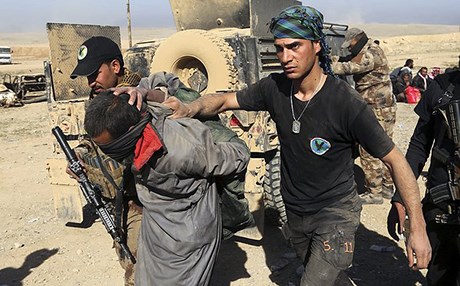By:Justin D. Santabarbara
Impunity Watch Reporter, Middle East

Since the Iraqi government regained control of Mosul and much of its northern provinces from the Islamic State in recent weeks, much emphasis has been placed on rebuilding the punitive institutions of government. In rebuilding its criminal justice capacity, Iraq has sought the counsel of the United Nations Human Rights reports, which began implicating the Islamic State human rights abuses in 2015. Together, with independent militia groups, Iraq’s Executive Office, under Haider Al-Abadi and the United Nations, launched an investigatory campaign in 2016. In August 2017, the Iraqi government charged a number of ISIS fighters in absentia with crimes against humanity. Al-Abadi is expected to formally address the United Nations Security Council in the coming weeks. He will likely request that the Security Council adopt a formal resolution to aid in the charging and capture of ISIS fighters.
The Iraqi government and the United Nations have focused the majority of its attention on balancing the sectarian divisions that continued to exist throughout the country. Since the Islamic State divided much of Iraq, the Shia-backed Iraqi military was forced to alienate many of its previous Sunni allies in pursuit of repelling ISIS. Additionally, Yazidis and Kurds have been historically persecuted by both Sunni and Shia. Until Al-Abadi gained the aid of western military forces in recovering Mosul, much of the Northern provinces were neglected, which left Yazidis and Kurds with little support. Al-Abadi’s most arduous challenge will continue to be regaining the trust of these religious sects, while also being successful in repelling ISIS fighters from the region. Human Rights Watch has been highly critical of the Iraqi government’s response to many of these groups, citing their continued detention and torturing of minority sects as a mechanism for screening their loyalties to ISIS.
The Iraqi investigation has faced much criticism from Human Rights Watch. It reports that ISIS fighters continue to be tried arbitrarily and with prejudice. While the imperative for national security remains a central priority for the government, Human Rights Watch has nearly 2,000 trials that have universally resulted in convictions and stringent sentences. Moreover, Human Rights Watch reports that Iraqi security forces have begun prosecuting lawyers, both domestic and international, that are representing the alleged ISIS fighters. Additionally, Iraqi courts do not issue different sentences for minor involvement or otherwise. The sentences have near universally been undisclosed, or death. Iraq continues its roundup by seeking additional avenues of criminal conduct. Among them include the possibility of charging doctors and other officials working under the Islamic State, but not directly toward their combative interests.
For more information, please see:
CBC News – Sectarian divisions exploited by ISIS still endure in Iraq – 5 September 2017
Human Rights Watch – The Justice Question After ISIS – 25 August 2017